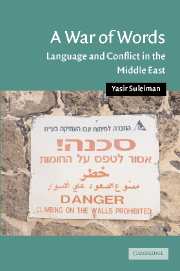Book contents
- Frontmatter
- Contents
- List of illustrations
- List of tables
- Acknowledgements
- 1 Introduction
- 2 Language, power and conflict in the Middle East
- 3 When language and dialects collide: Standard Arabic and its ‘opponents’
- 4 When dialects collide: language and conflict in Jordan
- 5 When languages collide: language and conflict in Palestine and Israel
- 6 Language and conflict in the Middle East: a conclusion
- Appendix 1
- Appendix 2
- References
- Index
- Cambridge Middle East Studies 19
3 - When language and dialects collide: Standard Arabic and its ‘opponents’
Published online by Cambridge University Press: 05 June 2012
- Frontmatter
- Contents
- List of illustrations
- List of tables
- Acknowledgements
- 1 Introduction
- 2 Language, power and conflict in the Middle East
- 3 When language and dialects collide: Standard Arabic and its ‘opponents’
- 4 When dialects collide: language and conflict in Jordan
- 5 When languages collide: language and conflict in Palestine and Israel
- 6 Language and conflict in the Middle East: a conclusion
- Appendix 1
- Appendix 2
- References
- Index
- Cambridge Middle East Studies 19
Summary
Introduction
In chapter 2, we dealt with a set of linguistic phenomena to highlight the principles at play in intra- and intergroup conflict in situations of asymmetrical power relations. Placing these phenomena in their socio-political context, we were able to establish aspects of their symbolic meanings by invoking the concepts of identity, tradition and modernization. The role of language as a value-laden resource in society was given as the reason for its ability to act as a proxy for the prosecution of extra-linguistic conflicts of various kinds (see Cameron 1995; Heller 1999; Laforest 1999; Rickford 1999). By examining the discursive practices and lexical choices involved in articulating linguistic conflicts pertaining to Arabic, we were able to highlight the rhetorical import they have – vis-à-vis affect and task orientation – in their socio-cultural milieu. The present chapter will explore these themes further by analysing a number of debates involving Standard Arabic (SA) in the past two centuries, particularly the competition between this variety of the language and the dialects. Some of these debates will be familiar to specialists in Arabic language and culture. This chapter is intended for readers from outside this constituency, who are its primary audience.
To help establish the parameters of this chapter, I will offer the following preliminary remarks. As used in this work, SA designates the literary form of the language in its modern and pre-modern manifestations, what is called fuṣḥā in Arabic, although the main emphasis will be on the former.
- Type
- Chapter
- Information
- A War of WordsLanguage and Conflict in the Middle East, pp. 58 - 95Publisher: Cambridge University PressPrint publication year: 2004



